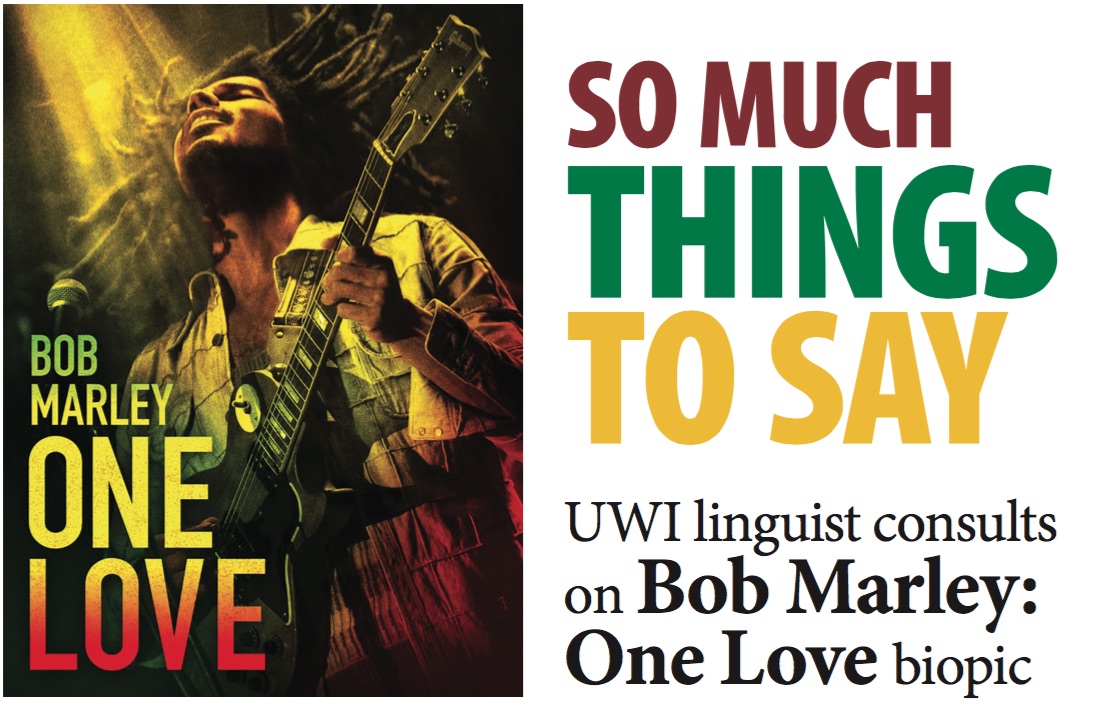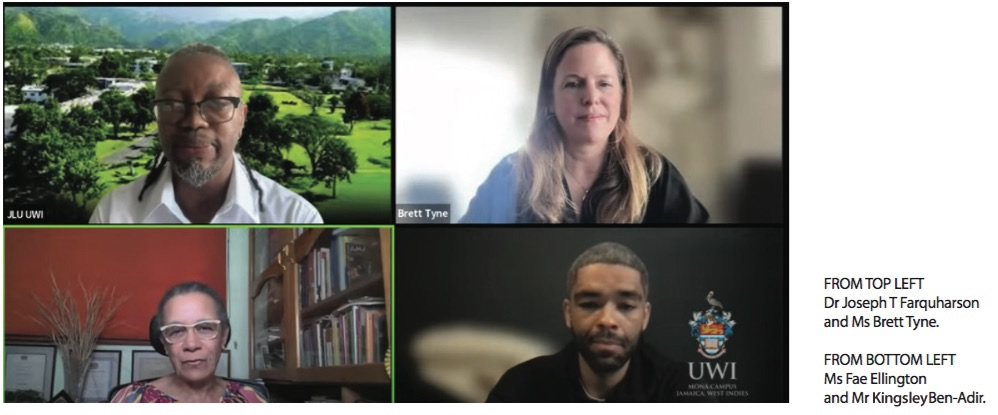
American Jurist and defender of the US First Amendment Oliver Wendell Holmes Jr once stated, “Language is the dress of thought; every time you speak your mother tongue, you reveal a part of yourself.” Despite serving the US Supreme Court from 1902 to 1932, his words still have relevance today worldwide.
Music is another important signifier of a people and culture, and in the Caribbean there is perhaps no greater representative of regional identity than Jamaican-born musical icon Robert Nestor Marley, beloved worldwide as Bob Marley. In February 2024, after an early release in Jamaica, Bob Marley: One Love, a film on the artist’s life and music, was released worldwide.
When it came time to capture the authentic voice of Jamaican people on film, the filmmakers approached Dr Joseph T Farquharson, Senior Lecturer in Linguistics at UWI Mona and current coordinator of the Jamaican Language Unit (JLU) for assistance.
Dr Farquharson is also an Honorary Research Fellow of the Department of Modern Languages and Linguistics (DMLL) at UWI St Augustine.
In a video discussion on the film, lead actor Kingsley Ben-Adir explained that “I don’t have anything physically the same as Bob, even the voice.”
Ben-Adir, whose star has been rising with prominent roles in Barbie, One Night in Miami (where he played Malcolm X), and even as the main antagonist in the Marvel Cinematic Universe TV show Secret Wars, says it was crucial to capture the essence of Marley, and that includes the way he spoke.
“I have no business being a part of this film if I’m not going to work like that to represent the culture,” he says. “There was never going to be a version of this film where there wasn’t an attempt to represent the way Bob spoke specifically, because I think Bob would have been against that.”
It was Fae Ellington, well-known Jamaican broadcaster and dialect coach on One Love, who came up with the idea of approaching UWI Mona linguists for assistance with the film. Specifically, she was aware of the work of the campus’s Jamaican Language Unit (JLU) in the Department of Language, Linguistics and Philosophy in the Faculty of Humanities and Education. For more than 20 years, linguists at the JLU have been doing the work of language planning and developing a language policy for the Jamaican language and its users.
The unit has been involved in work towards the acceptance of Jamaican as the national language, with the ultimate goal of seeing it co-officialised alongside English.
Ellington recommended Dr Farquharson. He took up the job of Linguistics Consultant to support One Love’s dialect coach, Brett Tyne. Tyne, who was a dialect coach on major films such as Dune, The Road House, and The Boys on the Boat, was the coach for both Ben-Adir, and co-star Lashana Lynch (another rising star), who played Rita Marley.
“I worked extremely hard,” Dr Farquharson recalls fondly, “because I was working with people who would not rest at all.”
As the Linguistics Consultant, Dr Farquharson was tasked to not only support Ms Tyne’s work, but also to check the different versions of the script to ensure the dialogue was reflective of the language, whether it was the Jamaican language or the English language.

During his time spent on this job, from 2022 until the post-production phase, Dr Farquharson was able to lean heavily on a writing system developed by the JLU. The Cassidy-Le Page Writing System is a phonemic system for writing Jamaican originally developed by the linguists Frederic Cassidy and Robert Le Page. The JLU, under linguist Hubert Devonish, Emeritus Professor of Linguistics at Mona, worked on the system for wider public acceptance, and has conducted major nationwide surveys and research projects.
The Cassidy-JLU system developed a standardised Jamaican alphabet. For example, in Jamaican, “sick” is spelt “sik”, and “band” is spelt “ban”. The writing system was wholeheartedly welcomed by Brett Tyne and she used it to convert Ben-Adir’s and Lynch’s lines in the script.
The system was used not only for the Jamaican language in the film’s script, but also the English used by Jamaican speakers, in particular Lynch as Rita Marley.
Since its inception, the JLU has been working to ensure the growth of the Jamaican language. The 2005 Language Attitude Survey of Jamaica revealed that attitudes towards the Jamaican language have greatly improved within the last two to three decades. Over 70 percent of Jamaicans now view Jamaican Creole as a language. By 2011, the JLU, as part of the International Centre for Caribbean Language Research with representatives on all campuses, worked to produce the Charter on Language Policy and Language Rights in the Creole-speaking Caribbean, a framework for national and regional language policies. The Charter takes into account the language rights and freedoms provided for in various international instruments, including the 1996 Universal Declaration of Linguistic Rights.
“Many Jamaicans themselves threw out Dialect years ago as a term for the language. Most of the population refers to the language as Patois or Jamaican Patwa,” says Dr Farquharson. “We are [also] moving away from that, because Patois does not distinguish us from all the other languages that are referred to as Patois [including French Creole varieties].”
These developments, he notes, are not only the responsibility of linguists. Artists, like musicians (and filmmakers), also have an enormous role to play in creating a shift in how Caribbean people view their native languages, and working with linguists is essential.
Currently, he is on sabbatical and is Vice-President (President Elect) of the Society for Caribbean Linguistics, which recently celebrated the 50th anniversary of its founding at UWI St Augustine. During his sabbatical, Dr Keren Cumberbatch, a UWI St Augustine PhD graduate, is Acting Coordinator.
As to Bob Marley: One Love, it had an opening day gross of US$100,000 in Jamaica, a box office first for the country. Reviewers have been particularly positive about Ben-Adir’s portrayal of the man himself. Praised for his dedication on the project, he was quick to point out the importance of the language team.
“It really was all of us,” he says. “The time we had to work on the language leading up to filming was essential.”